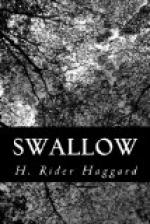Here we heard that Moselikatse was advancing to make an end of us, so we made our laager as strong as we could, lashing the disselboom of each waggon beneath the framework of that before it and filling the spaces beneath and between with the crowns and boughs of sharp-thorned mimosa trees, which we tied to the trek tows and brake chains so that they could not be torn away. Also in the middle of the laager we made an inner defence of seven waggons, in which were placed the women and children, with the spare food and gunpowder, but the cattle we were obliged to leave outside. Early on the morning when we had finished the laager we heard that the impi of Moselikatse was close to us, and the men to the number of over thirty rode out to look for it, leaving but a few to defend the camp.
About an hour’s ride away they found the Kaffirs, thousands of them, and a Hottentot who could speak their tongue was instructed to call to them and ask them why they attacked us. By way of answer they shouted out the name of their chief and began to charge, whereupon our men dismounted from their horses and opened fire upon them, mounting again before they could come near. So the fight went on until the laager was reached, and many Kaffirs were killed without any loss to the Boers, for luckily in those days the natives had no firearms.
I remember that we women were moulding bullets when the men rode in, and very thankful we were to find that not one of them was even wounded. While they ate something we washed out their guns, and at intervals near the places where each man must stand behind the waggons we piled little heaps of powder and bullets upon buckskins and pieces of canvas laid on the ground; also we did all we could to strengthen our defences still further by binding ox-hides over the waggon wheels and thrusting in more thorns between them.
Then, as the enemy was still preparing to attack us, the Heer Celliers called us together, and there in the laager, while all knelt around him, even to the smallest child, he put up a prayer to God asking that we might be forgiven our sins, and that He would look upon us and protect us in our great need.
It was a strange sight. There we all knelt in the quiet sunshine while he prayed in an earnest voice, and we followed his words with our hearts, every one of us, men and women, holding guns or axes in our hands. Never had human beings more need for prayer, for through the cracks between the waggons we could see Moselikatse’s Zulus, six or seven thousand of them, forming themselves into three bodies to rush upon us and murder us, and that was a dreadful sight for fifty or sixty people, of whom some were little children.
When we had finished praying, husbands and wives and parents and children kissed each other, and then the little ones and some of the women who were sick or aged were put behind the seven waggons in the centre of the laager, round which were tied the horses, while the rest of us went to our stations, men and women together. I stood behind Jan and Ralph, who fought side by side, and, assisted by a girl of fourteen years of age, loaded their spare guns. Now there was a great silence in the camp, and suddenly in the silence, Jan, who was looking through his loophole, whispered:




